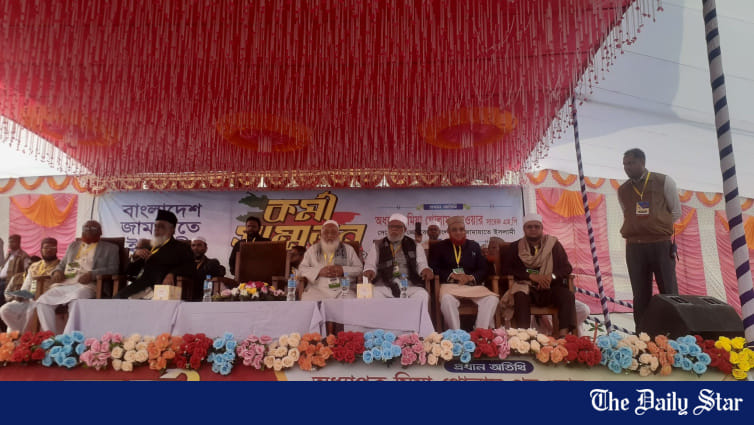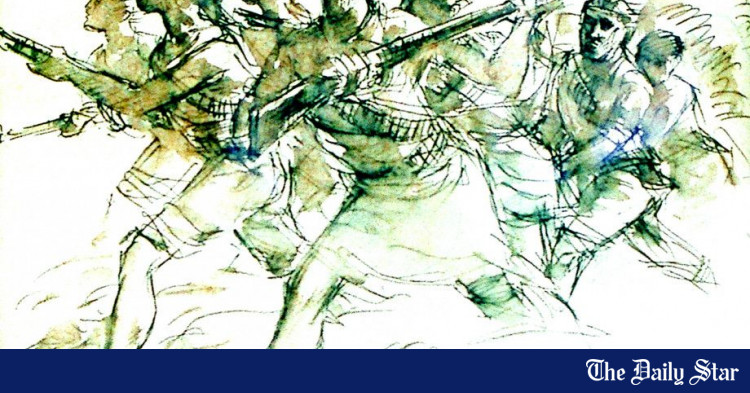Date of Event:
Nov 11, 2024
Hindu rally of Jamaat-e-Islami held in Khulna
Dumuria Upazila Hindu Committee of Jamaat with 11 members announced

A Hindu rally of Jamaat-e-Islami was held this afternoon at Dumuria in Khulna.
Jamaat-e-Islami organised the rally and discussion session with members of the Hindu community at the Jubaid Ali Auditorium in the upazila.
Secretary General of Bangladesh Jamaat-e-Islami former MP Prof Mia Golam Parwar was present as the chief guest at the meeting.
In his speech, Golam Parwar spoke about Bangladesh's journey towards a fair and just society, emphasising that today's Bangladesh was born out of historic student movements and mass uprisings against discrimination and authoritarianism.
He outlined Jamaat-e-Islami's primary goal to support the youth in building a country based on justice, equality, and non-sectarian values, as well as restoring peace and order amid current challenges.
He further urged leaders of Jamaat and the Hindu community in Dumuria to work together in promoting stability and harmony in the region.
At the meeting, Golam Parwar announced Dumuria Upazila Hindu Committee with 11 members as Krishna Nandy as president, school principal Deb Prosad as general secretary and Gautam Mandal as treasurer.
Babu Proshant Mandal, was made vice president of the committee, Dr Haridas Mondal and Kanai Lal Karmakar the joint general secretaries, Buddhadev Mondal, Amulya Kumar Sarkar, Pulkesh Mondal, Biplab Sarkar, Pradeep Kumar Sarkar were declared as members.
He instructed the committee to form a 101-member committee within the next week.
The event was presided over by Dumuria upazila unit Ameer Maulana Mokhtar Hossain, with South Secretary Maulana Habibur Rahman and North Secretary BM Alamgir Hossain in attendance.
Khulna district Ameer Maulana Emran Hossain, district Assistant Secretary Munsi Moinul Islam spoke at the programme, among others.
Dumuria Upazila Hindu Committee of Jamaat with 11 members announced
A Hindu rally of Jamaat-e-Islami was held this afternoon at Dumuria in Khulna.
Jamaat-e-Islami organised the rally and discussion session with members of the Hindu community at the Jubaid Ali Auditorium in the upazila.
Secretary General of Bangladesh Jamaat-e-Islami former MP Prof Mia Golam Parwar was present as the chief guest at the meeting.
In his speech, Golam Parwar spoke about Bangladesh's journey towards a fair and just society, emphasising that today's Bangladesh was born out of historic student movements and mass uprisings against discrimination and authoritarianism.
He outlined Jamaat-e-Islami's primary goal to support the youth in building a country based on justice, equality, and non-sectarian values, as well as restoring peace and order amid current challenges.
He further urged leaders of Jamaat and the Hindu community in Dumuria to work together in promoting stability and harmony in the region.
At the meeting, Golam Parwar announced Dumuria Upazila Hindu Committee with 11 members as Krishna Nandy as president, school principal Deb Prosad as general secretary and Gautam Mandal as treasurer.
Babu Proshant Mandal, was made vice president of the committee, Dr Haridas Mondal and Kanai Lal Karmakar the joint general secretaries, Buddhadev Mondal, Amulya Kumar Sarkar, Pulkesh Mondal, Biplab Sarkar, Pradeep Kumar Sarkar were declared as members.
He instructed the committee to form a 101-member committee within the next week.
The event was presided over by Dumuria upazila unit Ameer Maulana Mokhtar Hossain, with South Secretary Maulana Habibur Rahman and North Secretary BM Alamgir Hossain in attendance.
Khulna district Ameer Maulana Emran Hossain, district Assistant Secretary Munsi Moinul Islam spoke at the programme, among others.








































